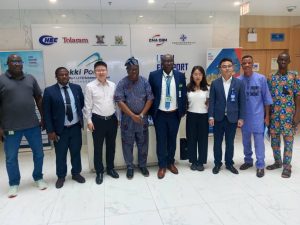
LEKKI DEEP SEA PORT TO CONTRIBUTE $360BN TO NIGERIA’S GDP, CREATE 170,000 JOBS – MD
By Aishat Momoh. O.

The Lekki Deep Sea Port is projected to generate $360 billion for Nigeria’s Gross Domestic Product (GDP) and create over 170,000 jobs during its 45-year concession period, according to the port’s Managing Director, Wang Qiang.
Speaking at a stakeholders’ meeting in Lagos on Tuesday, Qiang said the projection was made in collaboration with the Federal Government, describing the port as a cornerstone for Nigeria’s trade expansion and industrial growth.
“We have a 45-year concession period, and during this time, we expect to generate about $360bn for Nigeria,” Qiang stated. “This estimate was calculated with the Federal Government.”
He explained that the port, despite its world-class facilities, is still in the early stages of operation and continues to operate at a loss due to its high initial capital investment.
“We invested over one billion US dollars to complete the construction of Lekki Port,” he said. “It will take some time to recover the investment, but the port is running well and steadily improving.”
Qiang described the facility as a vital link in Nigeria’s logistics and trade infrastructure, urging stronger government support to sustain its long-term success.
“Lekki Port is a critical point in the logistics chain. We need continued government support, especially in infrastructural development,” he noted.
The Port Manager of the Nigerian Ports Authority (NPA), Emmanuel Anda, hailed the port’s performance, describing it as a “game-changer” for Nigeria’s maritime and export sectors.
“Exports through this port are leveraging imports we have never had it this good,” Anda said. “If we continue on this trajectory, Nigeria could become a global export hub within 10 to 15 years.”
He also noted that improved access roads, constructed through joint efforts by federal and state governments, have resolved earlier logistical bottlenecks around the port.
“Access used to be an issue; it’s no longer a problem. The infrastructure around the port is far better now,” he added.
Anda encouraged Nigerian businesses to take advantage of the port’s modern facilities, saying, “This is the best thing to have happened in Nigeria for quite some time. We need the public to experience the quality of services available here.”
The Chief Commercial Officer of Lekki Freeport Terminal, Kehinde Olubi-Neye, said automation has significantly improved efficiency and reduced congestion, enabling Lekki Port to handle the largest vessels in Nigeria.
Similarly, Adesuwa Ladoja, Managing Director of the Lagos Free Zone, commended the project’s resilience, noting that it was completed amid the global COVID-19 pandemic.
“Lekki Port represents world-class innovation in Nigeria’s maritime sector,” she said. “It was developed during COVID, at a time when most projects were on hold, yet this one stood out.”
Prof. Akanbi Ilupeju, Dean of the Faculty of Arts at the University of Lagos, called for broader public awareness of the port’s national significance.
Host community representative Adesanya Adeshina also praised the company’s corporate social responsibility initiatives, citing programmes in youth empowerment, skills training, and education that have improved livelihoods.
“The company’s efforts are a game-changer for local communities,” Adeshina said.
Located 65 kilometres east of Lagos within the Lagos Free Zone, the Lekki Deep Sea Port occupies over 90 hectares and is West Africa’s deepest port, with a 16.5-metre depth capable of receiving 18,000 TEU vessels for transhipment operations.
Construction began in 2020 after the concession was signed in 2019. Phase 1 was completed in 2022, and commercial operations commenced in April 2023.
The port is expected to serve as a major catalyst for industrialisation, trade facilitation, and foreign investment, positioning Nigeria as a regional maritime hub.

